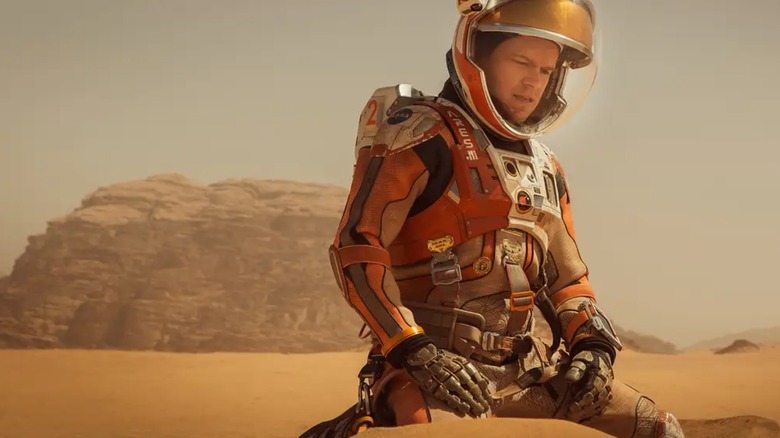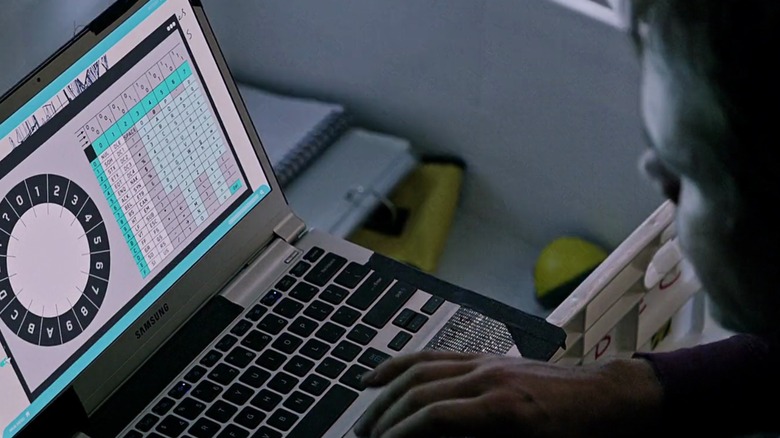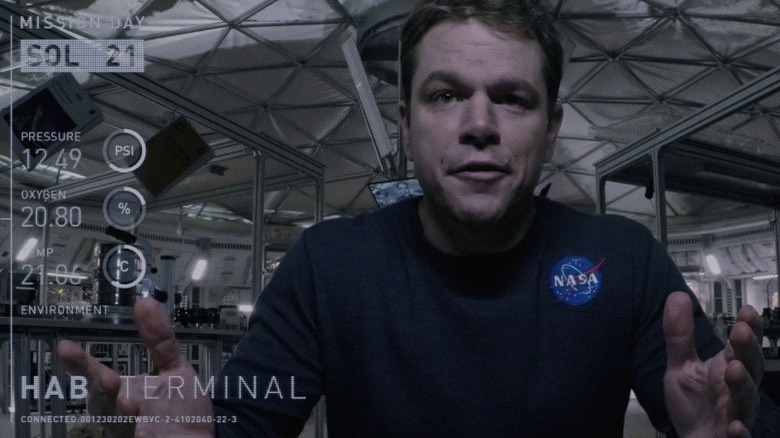Ridley Scott Couldn't Wrap His Head Around The Martian's Computer Science
The hallmarks of a Ridley Scott sci-fi film include characters trapped in bleak situations, who persevere against impossible odds to survive. This zeal to survive is an integral aspect of Scott's "Alien," while his "Blade Runner" is an existential meditation on what it means to be human. In Scott's long tradition of films about human survival, "The Martian" emerges as a remarkable tale about an astronaut stranded on Mars grappling with the technological challenges that threaten to endanger his life. Scott's "The Martian," based on Andy Weir's brilliant novel of the same name, does its best to not brush over the science in science fiction, as Mark Watney's (Matt Damon) survival hinges on adapting to a hostile planet that only scientific ingenuity can help make habitable.
However, did Sir Ridley Scott have a solid grasp on the science-focused aspects of "The Martian?" According to the director, he was "intimidated" by the film's script, as he "wasn't very good" at mathematics and science in school. In order to understand the script in a way that was conducive to him, Scott etched extensive storyboards and took a visual approach to the complex Mars story. But when it came to understanding the computer technology in "The Martian," which was featured in several sequences, Scott was at a loss and struggled to understand how he would portray them authentically. Basically, Scott was struggling to "science the s*** out of this." So, how did he manage to do it?
Bamboozled by computer code
There is one particular scene in which the characters in "The Martian" use ASCII (American Standard Code for Information Interchange) to communicate with one another. ASCII is a standard method of communicating encoded messages via electronic communication, and Scott had to find a way to convey this mechanic while keeping it accessible and without dumbing it down at the same time. Speaking to Space.com, Scott explained that the "computer code bit" concerned him the most while filming:
"...The computer code bit, because it's like math. That has always been a block for me. And, therefore, when I had to shoot the sequence about ASCII, I went: 'Whaaat?! How am I going to show this?'...ASCII code, fundamentally, I couldn't get my head around easily. So we just blocked it out the way the book had it."
Weir's book was akin to an engineering manual that laid out the nuances of surviving on a harsh planet, and Scott closely followed the book's ASCII sequences to avoid complications. The hexadecimal system is used by Watney in the scene linked above, in which he finds a creative way to communicate with NASA using limited resources.
With the aid of old-timey cameras that can rotate 180 degrees, Watney combines the hexadecimal system with the ASCII code table to communicate short, to-the-point messages. NASA receives it and replicates Watney's methods to ask things like "HOW ALIVE?" and "CROPS?" to understand how he had managed to survive for upwards of 100 days on Mars. The communication system starts with a rudimentary "yes" or "no" mechanism and moves towards more complex and precise communication, which allows Watney to survive his predicament with the aid of sheer willpower (and a solid grasp on encoded message systems) alone.
The focus of The Martian is its characters
Although layman audiences like me might still struggle with the exact mechanics of how the ASCII code or the hexadecimal system work, Scott managed to convey the basics in a way that is intuitively graspable. Irrespective of whether one understands complex codes or not, it is clear that Watney approaches the problem in steps that are practical. He starts with basic communication with the signs and the cameras, and then devises a complex communication mechanism to get his messages across. The technical team back at NASA solves the last stretch of the problem by helping him arrive at a precise communication scheme with the aid of the Pathfinder's frequency.
"The Martian" is primarily about human grit and survival, but it is also about human communication, and how pivotal this aspect can be in dire scenarios. Earlier in the film, we witness a failure in communication when Watney is informed that his crew is unaware that he's alive, and when he expresses his anger, NASA asks him to mind his language. The fact that everyone involved in the situation, who are essentially practical, extremely intelligent folks trained to deal with such scenarios, failed at basic human communication is one of the prevailing themes in the film. They overcome this obstacle in the hexadecimal scene, and the results are profound and emotionally poignant.
In essence, the scientific aspects of "The Martian" are integral to the characters' fates, but the emphasis still lies with aspects of humanity that remain unquantifiable. The idea that a man who has every reason to give up does not do so but rages against all odds to survive, is endearingly life-affirming. For Scott to achieve this, in spite of computer code bamboozlement, is quite an achievement.


